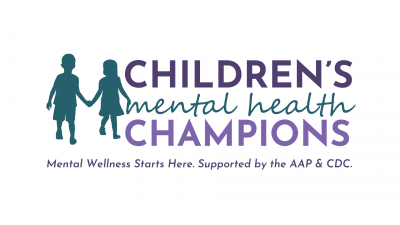Early Childhood
Connecticut Mental Health Champion

 In August 2020, Connecticut was selected as a Children’s Mental Health Champion by the Association of University Centers on Disabilities (AUCD) National Center on Disability in Public Health through a cooperative agreement with the Centers for Disease Control and Prevention (CDC). Mental Health Champions provides support for children and families due to the COVID-19 pandemic, which has had a negative impact on the wellbeing in our states’ communities. Champions were tasked to develop state-specific work plans to address mental health needs, through promotion, prevention, and systemic collaboration (e.g., school, healthcare, and community) to promote better connections between these systems.
In August 2020, Connecticut was selected as a Children’s Mental Health Champion by the Association of University Centers on Disabilities (AUCD) National Center on Disability in Public Health through a cooperative agreement with the Centers for Disease Control and Prevention (CDC). Mental Health Champions provides support for children and families due to the COVID-19 pandemic, which has had a negative impact on the wellbeing in our states’ communities. Champions were tasked to develop state-specific work plans to address mental health needs, through promotion, prevention, and systemic collaboration (e.g., school, healthcare, and community) to promote better connections between these systems.
In October of 2023, UConn UCEDD was selected for another term as a Mental Health Champion from the CDC and American Academy of Pediatrics. Our focus this term is to support Federally qualified health centers or clinics that serve young children in Connecticut with videos and materials on social emotional milestones and how parents can identify the milestones throught interactions and play.
A second area of focus is throught a partnership with the Village for Children and Families in Hartford. Connecticut has seen an increase of young children with mental health concerns saw numbers go up to 24% from 2018 to 2022. The access to therapy for young children has been a barrier across the state. In the Fall of 2023 a new mental health care models in Connecticut offer ER alternative to children in crisis, Village for Families & Children opened a outpatient Urgent Crisis Center (UCC) to serve our young population.
Click here to learn more about the CDC /AAP Mental Health Champions
As a part of the new model of intervention, the Village developed videos with the UCEDD to share the importance of Social Emotional Development.
Introduction to the Village Urgent Care Crisis Center
How Mindfullness can help Mental Health
The Importance of Social Emotional Development for Young Children
Previous Project Work
Within this 2nd year of funding, UConn UCEDD collaborated with Connecticut Children’s Hospital and Medical Center to develop mental health resources for families across the state. Children have faced almost two years of unprecedented challenges due to the pandemic. Connecticut Children’s has seen a tremendous increase in patients seeking behavioral health services via the emergency department. In 2021, 12.6% of children ages 3-17 in Connecticut received mental health care; compared to the national average of 10.8%. Currently we do not see a decline in families seeking care which has put a strain on the healthcare system causing delays in services.
To address the growing need, the General Assembly’s Committee on Children championed Public Act 21-116. The act requires a list of (A) providers of such resources, including, but not limited to, mobile crisis intervention services, (B) the physical location of each provider, if applicable, (C) the types of services offered by each provider, and (D) contact information for each provider to be given to all families in healthcare and school settings.
Video Resources
Steven C. Rogers, MD, CPST, is an attending physician in the emergency department and is the emergency department’s behavioral health and psychiatric coordinator. Dr Rogers is working to improve care for this young population including expanded support for suicidal patients and their families.
Printed Resources
Are you looking for Mental Health Support for your child? The free resources developed by the UConn UCEDD and Connecticut Children’s are linked below.
Mental Health Family Support - english
Mental Health Family Support - spanish
Additional Resources
Connecticut Children's
Previous Work Objectives
With this funding opportunity, UConn UCEDD collaborated with the Connecticut Department of Children and Families (DCF) to support families and children affected by the pandemic. COVID-19 presented a number of stressors for Connecticut families served by DCF. Some of the stressors include loss of job/income, lack of childcare, lack of resources, and home schooling.
In partnership with DCF, a work group was developed to identify the needs for families and providers. Through our collaboration, we adapted the following evidence based materials from the Association of University Centers on Disabilities (AUCD) and The Center for Disease Control (CDC) and trained caseworkers how to work with families to reduce behavioral concerns at home. These free trainings are linked below.
Module 1 Strengthening the Parent Child Relationships
Lesson 1 – Introduction to FIT Course & Module 1 Key Concepts
Lesson 2 – Communication
Lesson 3 – Using Attention Strategically
Lesson 4 – Praise
Lesson 5 – Scheduled Parent-Child Playtime
Module 2 Evidence Based Practice and Purposes - Structuring the Environment to Prevent Misbehavior
Lesson 6 – Overview of Module 2 Key Concepts
Lesson 7 – Establishing Routines and Family Rules
Lesson 8 – Giving Clear Directions
Lesson 9 – Anticipating Problems, Using Redirection, and Easing Transitions
Lesson 10 – Helping Your Child Calm Down
Module 3 Evidence Based Practice and Purposes - Effective Strategies for Addressing Misbehavior
Lesson 11 – Overview of Key Concepts for Module 3
Lesson 12 – Time Out
Lesson 13 – Logical Consequences and Removal of Privileges
Lesson 14 – Conclusion
Family Interaction Training (FIT) Program: A Critical New Tool to Support Families and Communities
Family Interaction Training (FIT) is a behavioral training program designed to help parents of young children with disruptive behavior. FIT materials were developed for use by professionals who work with young children but who are not mental health experts, to help parents learn evidence-based parenting strategies to prevent or reduce challenging behaviors. The evaluation feedback thus far has been overwhelmingly positive. With the need to help families and communities being so great, we are making these evaluated FIT materials available now to professionals who work with parents of young children, while work continues to refine the content and develop more tools.